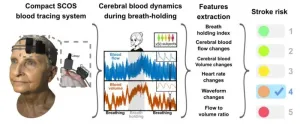(Press-News.org) A study of more than 28,000 pregnancies from 2022 has found that the majority of pregnant people received the COVID-19 vaccine during its initial release.
The study, co-led by McMaster University and the University of British Columbia, used data from ICES, an independent, not-for-profit research institute, to provide insight into vaccination rates among one of the groups most vulnerable to health complications caused by COVID-19.
The research, published in the Canadian Medical Association Journal (CMAJ) on Oct. 1, 2024, determined that about 79 per cent (22,581) people who gave birth in Ontario during the first three months of 2022 received their first COVID-19 vaccine dose, and 75 per cent (21,425) received a second dose by the time they were three months postpartum.
Of those who received a first dose, half did so before they were pregnant and only four per cent delayed it until after they gave birth. Researchers say this demonstrates high uptake for a new vaccine, especially during pregnancy.
“It’s encouraging to see this level of vaccination amongst pregnant people because COVID-19 outcomes can be so severe when you’re pregnant. This feels like a public health victory, with people able to access the information they needed to make vaccination decisions from public health sources or clinicians they trust like their family doctor,” says Meredith Vanstone, senior author of the study and associate professor with McMaster’s Department of Family Medicine.
A key finding of the study was that pregnant people were still slightly less likely to receive the vaccine than non-pregnant females of the same age. Among the non-pregnant cohort of same-aged female Ontarians, 83 per cent received an initial dose and 80.5 per cent a second during the same period.
The study also found uptake of the vaccine to be lower among younger pregnant people.
“Throughout the COVID-19 pandemic, misinformation about the vaccines targeted pregnant people, complicating their ability to make well-informed decisions about their health. Despite these challenges, it is reassuring to see that so many pregnant people were able to navigate the confusion and ultimately make decisions that protected their health and the health of their babies.” said Devon Greyson, first author of the study and assistant professor with the School of Population and Public Health at the University of British Columbia.
The researchers accessed a provincial dataset containing de-identified COVID-19 vaccine records to conduct this study.
“We linked information about people who gave birth during our study and their use of health-care services to understand factors that may be related to COVID-19 vaccine uptake, such as where they live or if they gave birth for the first time. Accessing and linking information for all pregnant and non-pregnant people in Ontario who were eligible for the vaccine makes us more confident in our findings,” says Rebecca Correia, a McMaster University PhD student who coordinated the data access request and analysis.
The study was supported by funding from the Canadian Institutes of Health Research (CIHR), a Banting Postdoctoral Fellowship, the Canada Research Chairs program, a Michael Smith Health Research BC Scholar Award and a CIHR/Public Health Agency of Canada Applied Public Health Chair.
----
Available for interviews:
Senior author Meredith Vanstone can be contacted directly by email at vanstomg@mcmaster.ca.
First author Devon Greyson can be contacted directly at devon.greyson@ubc.ca
Rebecca Correia can be contacted directly at correirh@mcmaster.ca.
For any additional information or to obtain an embargoed copy of the study, contact Adam Ward, media relations officer with McMaster University’s Faculty of Health Sciences, at warda17@mcmaster.ca. Please note, I am out of the office on Sept. 26 and 27. If you need assistance during that time, please contact Jennifer Stranges, at stranj4@mcmaster.ca.
END
Most pregnant people got vaccinated for COVID-19 in 2022
2024-10-01
ELSE PRESS RELEASES FROM THIS DATE:
Coral reef destruction a threat to human rights
2024-10-01
A human rights-based approach to coral reef protection could ensure governments are held to account for safeguarding marine ecosystems and empower local and Indigenous communities to demand sustainable solutions and climate justice, a new study suggests.
An estimated one billion people rely on healthy coral reefs globally for food security, coastal protection and income from tourism and other services. If reefs and their ecosystems are lost, the impact on human health and economic wellbeing would be catastrophic.
Lead ...
Tongan volcanic eruption triggered by explosion as big as ‘five underground nuclear bombs’
2024-10-01
The Hunga Tonga underwater volcano was one of the largest volcanic eruptions in history, and now, two years later, new research from The Australian National University (ANU) has revealed its main trigger.
Until now, the cause of the cataclysmic event has remained largely a mystery to the scientific community, yet a student-led team of ANU seismologists has been able to shed new light on the natural explosion that initiated the event.
The student researchers analysed the climactic event’s noisy but valuable seismic ...
Syrian hamsters reveal genetic secret to hibernation
2024-10-01
A gene that limits cellular damage could be the key to surviving prolonged cold exposure.
Researchers have identified a gene that enables mammalian cells to survive for long periods at extremely low temperature, which animals experience during hibernation.
Body temperatures below 10 degrees Celsius (°C) swiftly prove fatal for humans and many other mammals, because prolonged cold stress causes cells to accumulate damaging free radicals—in particular lipid peroxide radicals—resulting in cell death and organ failure. But a few mammalian species can survive cold stress by hibernating. Hibernation in many small mammals involves ...
Tracking microplastics: FAMU-FSU College of Engineering researcher helps discover how microplastics move for better storm water management
2024-10-01
Microplastic pollution is a significant environmental problem that harms animals and people and affects ecosystems worldwide. These tiny pieces of plastic, smaller than five millimeters, are pushed by wind and water to move around the globe.
Nasrin Alamdari, an assistant professor in the FAMU-FSU College of Engineering’s Department of Civil and Environmental Engineering, is on a mission to learn more about microplastics and how they move.
In research published in Environmental Pollution, she helped examine how shape, size and density affect the speed at which ...
The Lancet Psychiatry: Conversion practice linked to greater risk of mental health symptoms, surveys of LGBTQ+ people in the USA suggest
2024-09-30
Analysis of questionnaires completed by 4,426 LGBTQ+ people in the USA suggests undergoing conversion practice targeting gender identity or sexual orientation is linked with symptoms of depression, PTSD and suicidal thoughts or attempts.
Cisgender and transgender participants also had more severe symptoms of depression and PTSD if they had undergone conversion practice.
Cisgender participants subjected to both types of conversion practice had a greater risk of suicidal thoughts and attempts than transgender participants – but mental health symptoms were more severe for transgender people overall, ...
Most accurate ultrasound test could detect 96% of women with ovarian cancer
2024-09-30
An ultrasound test that detected 96% of ovarian cancers in postmenopausal women should replace current standard of care test in the UK according to a new study.
In a paper published in Lancet Oncology today (Monday 30 September), research funded by the National Institute for Health and Care Research (NIHR) and led by Professor Sudha Sundar from the University of Birmingham compared all currently available tests to diagnose ovarian cancer in postmenopausal women head-to-head in a high-quality diagnostic test accuracy study.
Of the six diagnostic tests investigated, ...
Sylvester study: MRI provides early warning system for glioblastoma growth
2024-09-30
MIAMI, FLORIDA (EMBARGOED UNTIL SEPT. 30, 2024, AT 5:40 P.M. EDT) – A new study shows the potential power of imaging paired with radiation to shape treatment for glioblastoma patients in real time.
The study, led by researchers at Sylvester Comprehensive Cancer Center, part of the University of Miami Miller School of Medicine, is the first to quantify tumor changes in glioblastoma patients receiving MRI-guided radiation therapy. This novel technique, also known as MRI-linear accelerator or MRI-linac, pairs ...
Making soybeans smarter
2024-09-30
Ron Mittler is on a quest to create a smarter soybean. For years, mid-Missouri has withstood unpredictable weather patterns, including drought, heat waves and flooding — conditions that are known to hamper agricultural yields and make it difficult for farmers to produce. While we can’t control the weather, Mittler and his team are working to harness soybean crops’ natural ability to adapt to unfavorable weather conditions while also increasing their yields.
Working with $2.4 million from ...
New wearable laser device monitors brain blood flow to gauge stroke risk
2024-09-30
WASHINGTON — Researchers have developed a laser-based device that can be placed on the head to non-invasively monitor changes in brain blood flow and volume. The new device could one day help save lives by offering a direct and simple way to assess stroke risk based on physiological markers rather than indirect markers like lifestyle factors.
Strokes occur when blood flow to the brain is blocked or reduced, causing debilitating brain cell damage. With about 15 million people worldwide affected by strokes each year, it is the second leading cause of death and ...
BU professor receives $29M NIH grant to study dementia risk factors, prevention, and treatment
2024-09-30
FOR IMMEDIATE RELEASE
Monday, September 30, 2024
Contact:
Jillian McKoy, jpmckoy@bu.edu
Michael Saunders, msaunder@bu.edu
##
BU Professor Receives $29M NIH Grant to Study Dementia Risk Factors, Prevention, and Treatment
The Triangulation of Innovative Methods to End Alzheimer’s Disease project will use large, diverse datasets to examine whether interventions targeting alcohol use, depression, vision or hearing impairments, or social isolation can protect people from Alzheimer’s disease and related dementias. This project is a collaboration among Dr. Maria Glymour at Boston University School of Public Health, Dr. Jacqueline ...





